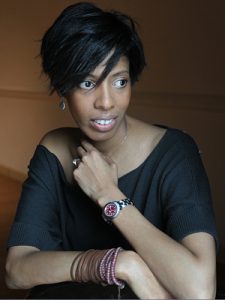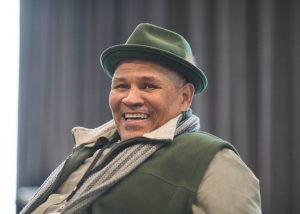The author of Stick Fly discusses the inspiration for the play, its setting and director Ron OJ Parson with Director of New Work & Dramaturgy Bobby Kennedy

Pictured: Lydia R. Diamond.
Bobby Kennedy: Where did the idea for Stick Fly come from?
Lydia R. Diamond: A couple of things happened with Stick Fly. I was writing a play called Voyeurs de Venus. It’s my favorite play to date, and I keep saying that because I want Michael to produce it. It was a harrowing play to write, just emotionally really draining. And I thought, I think I need to write something that will be like fun, fun to write and in my mind, easy. I was like, “I’m gonna write a well-made play,” just like that, just write a well-made play. And I knew I wanted to explore fatherhood and what that meant—absent and present fathers, and how present fathers can maybe be absent and all of that—but I wanted it to be like a comedy. I wanted to explore interracial relationships, in terms of how they land for black women in the black community. And how we look at one another, and how we perceive that we’re being viewed. There were so many little things but in my mind it was also going to be very light and frothy and easy to write because it would be in this very traditional format.
BK: But I’ve heard you say the play turned out to be very challenging to write?
LD: It was really, really hard! But still good for my purpose because it distracted me and made me focus in this very specific way. I remember after I wrote it, Craig Lucas had gotten his hands on it somehow and he called me and he was like, “You did that well. To make a well-made play look easy is just the hardest thing.” So that was my favorite compliment about Stick Fly. Anyway, I was driving down Lake Shore Drive when I heard this story on NPR’s Science Friday about how entomologists examine flies. I found it fascinating and I was like, “oh my god, that’s the metaphor at the heart of this thing that I’m writing.”
BK: Smart People featured four people working in/around academia, and everyone in Stick Fly has advanced degrees as well. Having grown up around professors and classrooms, what continues to fascinate you about people who move in these circles?
LD: Oh that’s interesting because I don’t think I consciously do. Well, I mean, for Smart People for sure I did because I was living in Cambridge and I wanted to write about Harvard. I had a certain love/hate relationship with Harvard. For this, I just like inhabiting contemporary worlds with people I recognize, and the people that inhabit my world, often just by circumstance, are people with advanced degrees. But it’s not something that I’m thinking about and it doesn’t, to me, feel foreign or a big deal. I knew I was writing about a well-heeled family with a long time house on Martha’s Vineyard, where African Americans have had a presence for hundreds of years, and that demographic would have advanced degrees. That’s all that was.
BK: Do you have any personal history with Martha’s Vineyard? What made you want to set the play there?
LD: I knew that I wanted to write about this demographic because I knew I wanted to write a play that talked about class and class strata within the African American community. I don’t think people think of that very often and I think it’s fascinating. I wanted to put in this house three classes of people and how that played out over the course of a weekend. I knew that I wanted them to be people who had been financially privileged for generations, so I knew it was either going to be Hilton Head or Martha’s Vineyard: two of the places in America where Black people have gone for a long time. But Martha’s Vineyard had an even richer history. I started the play prior to ever knowing I would move to Cambridge, Massachusetts. This was years before… I didn’t go to Martha’s Vineyard until shortly before the play had its Broadway premiere, and it was fascinating because it was the first time I’d been in a place where Black people could vacation and not be questioned. There’s a freedom there that was new for me.

Pictured: Ron OJ Parson at the first rehearsal for Ma Rainey’s Black Bottom. Photo by Joe Mazza — Brave Lux.
BK: You’ve known director Ron OJ Parson for over twenty years. Has he directed any of your work before? What is it about him as a director that made you want to collaborate again?
LD: No! And it doesn’t make any sense and we don’t know how that has happened! We started a theatre company together years ago called Onyx Theatre Company and we had these two triumphant years of hits and then we kind of fell apart, you know, as sometimes theatres do. And, I don’t know, it feels as though we’ve collaborated for years, you know? He’s directed lots of readings of mine through the years and we’ve just been in the same rooms and in the same circles forever so it’s a very natural collaboration. I think Ron is one of the most talented directors in America. I really, really do. Period. Ron is truly an artist and he’s about, making beautiful art, he’s not so much about “I wanna get famous.” If by circumstance he had started his career in New York he would be very, very famous nationally. I just think he’s brilliant. Every time I see a production that he has directed, it’s always the best production I’ve seen of that play.


No comments yet.